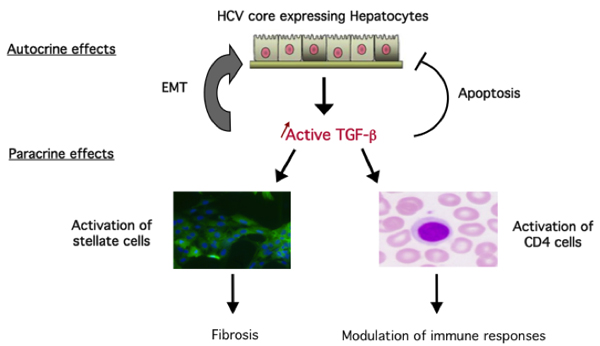The aim of this research project is to study the signalling pathways and TGF-ß target genes that are involved in HCV-mediated liver fibrosis and carcinogenesis. This project combines:
- in vitro studies to dissect molecular aspects,
- in vivo studies to define the impact of HCV core protein on the micro-environnement,
- clinical studies to determine the biological relevance of our observations.
Several studies have supported the notion that TGF-ß acts as a tumour promoting agent in liver cancer. The theme that emerged from our earlier studies was that a viral protein, HCV core, may shift TGF-ß responses from tumour suppression to tumour promotion through its ability to bind Smad3, the major transcription factor of TGF-ß signalling. In particular, HCV core expression is able to induce epithelial to mesenchymal transition (EMT) in a TGF-ß-dependent manner.
However, more recent findings have highlighted the fact that HCV core function probably progresses through multiple biochemical routes, which operate jointly to alleviate the threshold level of TGF-ß signalling. This has raised fundamental questions on the mechanisms that ensure the regulation of core inhibitory activity relative to the TGF-ß network. We have also established that HCV core is able to activate TGF-ß, a cytokine which is secreted in a latent biologically inactive form and affects the stromal environment in a paracrine manner.

Objectives
- To understand the molecular mechanisms by which HCV core protein actives TGF-ß.
- To understand the molecular mechanisms by which HCV core protein modulates TGF-ß responses in infected hepatocytes.
- To determine whether the selection of different variants of HCV core proteins during the course of carcinogenesis generates a shift in the biological responses of TGF-ß.
- To study TGF-ß activation and responses in mice that are transgenic for HCV core; these mice do not spontaneously develop fibrosis or tumours. We are trying to determine whether core protein might sensitise these mice to fibrosis or tumour development induced by different agents.
- To study TGF-ß activation and EMT development in biopsies from patients who have developed cirrhosis and HCC after HCV infection and establish a correlation with the aggressiveness of HCC.
- To supply powerful arguments in favour of a future evaluation of TGF-ß signalling modulators in the context of cancer therapy, and the identification of therapeutic markers of clinical value.
Publications
- Battaglia S, Benzoubir N, Ghigna MR, Guettier C, Bréchot C, Bourgeade MF. [Epithelial-mesenchymal transition and hepatocellular carcinoma]. Ann Pathol. 2009 Nov;29 Spec No 1:S65-6 PMID:19887256

- Battaglia S, Benzoubir N, Nobilet S, Charneau P, Samuel D, Zignego AL, Atfi A, Bréchot C, Bourgeade MF. Liver cancer-derived hepatitis C virus core proteins shift TGF-beta responses from tumor suppression to epithelial-mesenchymal transition. PLoS One. 2009;4(2):e4355. Epub 2009 Feb 3. PMID: 19190755

- Faresse N, Colland F, Ferrand N, Prunier C, Bourgeade MF, Atfi A. Identification of PCTA, a TGIF antagonist that promotes PML function in TGF-beta signalling. EMBO J. 2008 Jul 9;27(13):1804-15. Epub 2008 May 29. PMID: 18511908

- Atfi A. and Bourgeade M.F. Regulators of Smad2/3 transcription and phosphorylation "Transforming Growth Factor-beta in Cancer Therapy". In: Sonia B. Jakowlew, ed., Humana press 2007, p.77-90
- Seo SR, Ferrand N, Faresse N, Prunier C, Abecassis L, Pessah M, Bourgeade MF, Atfi A.
Nuclear retention of the tumor suppressor cPML by the homeodomain protein TGIF restricts TGF-beta signaling. Mol Cell. 2006 Aug;23(4):547-59.PMID: 16916642
- Benzoubir N, Lejamtel C, Battaglia S, Testoni B, Benassi B, Gondeau C, Perrin-Cocon L, Desterke C, Thiers V, Samuel D, Levrero M, Bréchot C, Bourgeade MF. HCV core-mediated activation of latent TGF-ß via thrombospondin drives the crosstalk between hepatocytes and stromal environment. J Hepatol. 2013 Dec;59(6):1160-8. PubMed PMID: 23928402.

